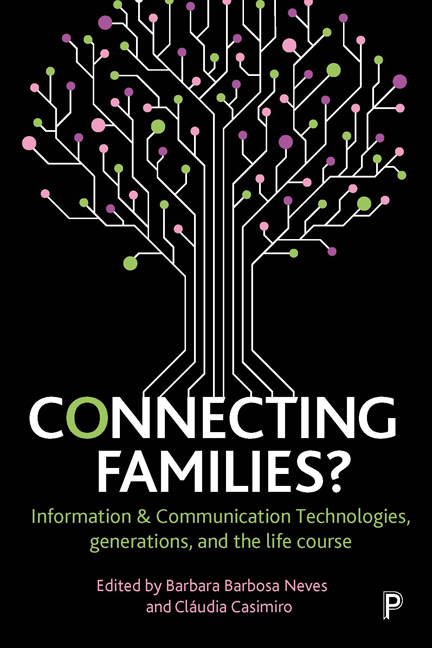Book contents
two - Theoretical perspectives on technology and society: implications for understanding the relationship between ICTs and family life
Published online by Cambridge University Press: 22 April 2022
Summary
Introduction
Recently there has been growing academic interest in the ways in which emerging information and communication technologies (ICTs) are changing family practices and relations. Particular focus has been given to the potential detrimental and/or beneficial effects of these technologies on family functioning across different dimensions, including family communication and cohesion; family roles, rules and intergenerational conflicts; relationship formation; intimacy patterns; and work‒home and family boundaries (Arnold, 2004; Bittman et al, 2004; Carvalho et al, 2015; Hertlein, 2012; Hughes and Hans, 2001; Jamieson, 2013; Lanigan, 2009; Lanigan et al, 2009; Mesch, 2006; Nansen et al, 2009, 2010, 2011; Wajcman et al, 2008, 2010). There has been additional interest in how these effects vary according to age, gender, social class and nationality (Cuban, 2017; Lim, 2016). Underlying these studies are particular theoretical conceptualizations of the relationship between technological and social change, which implicitly or explicitly frame the specific ways in which ICTs are understood to relate to family dynamics. For example, ICTs might be seen as driving changes in family life or, conversely, family members’ intentional uses of technologies can be understood as mediating their effects. In this chapter we examine how the technology‒society relation has been theorized and consider how this has influenced research on ICTs and family life. We begin by outlining four conceptual approaches to understanding the relationship between technology and society. The first three – ‘technological determinism’, ‘social constructivism’, and ‘actor network theory’ – have left a clear mark on the field, while the fourth, ‘posthumanist’, perspective is emergent and results from a recent ‘posthumanist turn’ associated with feminist studies of science (see Barad, 2007). Drawing on recent research, we then go on to illustrate how these approaches inform theoretical and empirical investigations of ICTs and family life. We conclude by suggesting that these theoretical formulations are important resources through which people, families, organizations, governments, educational systems, the media, and much more, experience and make sense of the role of technology in contemporary life, and devise interventions accordingly.
Theoretical perspectives on technology and society
Technological determinism
Technological determinism is a way of thinking about the relationship between technological and social change that informs academic, policy and popular accounts about the place of technology in everyday life (Marx and Smith, 1994; Wyatt, 2008).
- Type
- Chapter
- Information
- Connecting Families?Information and Communication Technologies, Generations, and the Life Course, pp. 21 - 40Publisher: Bristol University PressPrint publication year: 2018
- 2
- Cited by



